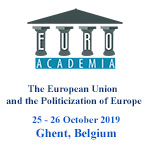Euroacademia Conferences
 Europe Inside-Out: Europe and Europeanness Exposed to Plural Observers (9th Edition) April 24 - 25, 2020
Europe Inside-Out: Europe and Europeanness Exposed to Plural Observers (9th Edition) April 24 - 25, 2020 Identities and Identifications: Politicized Uses of Collective Identities (9th Edition) June 12 - 13, 2020
Identities and Identifications: Politicized Uses of Collective Identities (9th Edition) June 12 - 13, 2020 8th Forum of Critical Studies: Asking Big Questions Again January 24 - 25, 2020
8th Forum of Critical Studies: Asking Big Questions Again January 24 - 25, 2020 Re-Inventing Eastern Europe (7th Edition) December 13 - 14, 2019
Re-Inventing Eastern Europe (7th Edition) December 13 - 14, 2019 The European Union and the Politicization of Europe (8th Edition) October 25 - 26, 2019
The European Union and the Politicization of Europe (8th Edition) October 25 - 26, 2019 Identities and Identifications: Politicized Uses of Collective Identities (8th Edition) June 28 - 29, 2019
Identities and Identifications: Politicized Uses of Collective Identities (8th Edition) June 28 - 29, 2019 The European Union and the Politicization of Europe (7th Edition) January 25 - 26, 2019
The European Union and the Politicization of Europe (7th Edition) January 25 - 26, 2019 7th Forum of Critical Studies: Asking Big Questions Again November 23 - 24, 2018
7th Forum of Critical Studies: Asking Big Questions Again November 23 - 24, 2018 Europe Inside-Out: Europe and Europeanness Exposed to Plural Observers (8th Edition) September 28 - 30, 2018
Europe Inside-Out: Europe and Europeanness Exposed to Plural Observers (8th Edition) September 28 - 30, 2018 Identities and Identifications: Politicized Uses of Collective Identities (7th Edition) June 14 - 15, 2018
Identities and Identifications: Politicized Uses of Collective Identities (7th Edition) June 14 - 15, 2018
Politicization of European Integration as a Source of Populism in Europe
-
-

-
Presentation speakers
- Burak Tangör, Department of International Relations, Hacettepe University, Ankara, Turkey
- Download presentation
Abstract:
The process of politicization of European integration has accelerated after signing the Maastricht Treaty. In the politicized European Union, the “technocrat” appearance of the European Commission has also changed and has become a college where the political balances are mostly observed after the Lisbon Treaty. The electoral process of the European Parliament in 2019 and its election results have created an anti-EU opposition with the Europeanist majority, bringing debate over sovereignty to the top of the EU agenda. The rise of populism in Europe is not limited to the percentage of votes of populist parties, but also manifests itself by the reflection of the programs they propose to government policies and the increasing scepticism towards European integration. In the European Union, there has been no consensus as to the nature of the authority and the extent of its authority yet. This study examines the political architecture of the European Union as sources of populist politics and the debates on democratic deficit within the EU. In this analysis, the dynamics of the politicization process within the framework of regional integration theories are revealed. It is argued that identity politics has become more decisive than economic considerations in a politicized European integration. Identity politics, therefore, is a source of populism through discussions of both sovereignty and democratic deficits in the European Union.
-













